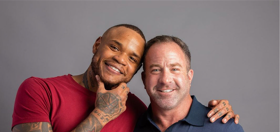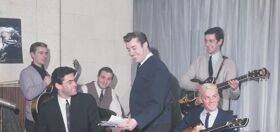
If there’s one adversary gays must not ignore, it’s stagnation: the paralysis of motion and progression. With new queer headlines daily, it may seem that we’re in no threat of slowing down, but visibility and advancement are not necessarily the same thing. That’s one thing gay filmmaker Matt Wolf (seen here in a picture we lifted from his website. If you think he’s a cute kid, you should see him now!) knows all too well.
Considering the political undertones of his short films, it comes as no surprise that Wolf once considered a career in politics. Coming out at the tender age of 14, Wolf threw himself into gay activism in his hometown of San Jose, CA, where he joined the burgeoning Gay-Straight Alliance Movement and pushed for anti-discrimination law to further the LGBT cause. It wasn’t until a few years later that he had another sort of coming out. “In high school, I decided that I didn’t want to work in politics. I wanted to be an artist.”
With a scholarship to New York University, Wolf packed up and headed east, where his activist roots and artistic dreams coalesced into something new entirely: the fictional documentary. Merging actual people and fabricated characters, Wolf’s movies explore gay issues to shed light on our at times unsettling reality.
Join us after the jump as we examine Wolf’s earlier works and learn that while his media stays the same, his ideas evolve as fast as the world changes.
Wolf’s first fantastic foray came in the form of Smalltown Boys. “It was a film that was directly addressing the clichés of generational difference between baby boomers and their children.” This disparity becomes more stark when considering the film’s two main subjects: legendary AIDS activist and artist David Wojnarowicz and his fictional daughter, a lesbian named Sarah conceived by a former feminist and doctor from Wojnarowicz’s donated sperm. Featuring footage from the early days of AIDS activism, as well as images from Wojnarowicz’s estate, the film juxtaposes the urgency of the eighties with the apparent apathy of Sarah’s generation, whose activism extends only to the salvation of My So-Called Life.
How about we take this to the next level?
Our newsletter is like a refreshing cocktail (or mocktail) of LGBTQ+ entertainment and pop culture, served up with a side of eye-candy.
When asked if she considers herself an activist, Sarah replied monotonously:
No, not really. I don’t feel a connection to that hippy stuff. I don’t want to protest or chant in the streets, or something. That’s my parents thing, or what they used to do when they were kids.
Sarah’s efforts to save the show turn from the activist streets of yore to the Internet super highway, where she and her online buddies bemoan the show’s impending cancellation on message boards and through virtual petitions. (see video below)
As Sarah languishes on the couch and online, lamenting the loss of Angela, Ricky, and the rest, she’s still keenly aware of the dangers of queer representation and purported acceptance. “When I see girls at school planting trees for AIDS or wearing red ribbons…I just want to scream at them, ‘Do you get what you’re doing?’” Despite her feelings, Sarah says nothing:
They are, I guess, supporting me and people like me, but it just feels like a slap in the face. Because, behind all the support and acceptance is real fear, and I just feel so invisible and I feel so small.
Sarah’s contradictory, yet utterly relatable, sentiments highlight one of the most controversial “gay” issue: images of queers in the media, a topic Wolf tackles more ferociously in his next piece, I Feel Love.
I Feel Love, explores these depictions with a look at another, albeit different, legendary gay figure: Andrew Cunanan, the serial killer whose final murderous shots took down Gianni Versace. In the film, Wolf introduces us to Joel Manero, the fictitious sole survivor of Cunanan’s rampage. Not surprisingly, the media fixates on Manero, whom a Charlie Rose-like journalist describes as “a leader for gay and lesbian people.” (See video below)
The media salivates over the Manero and Cunanan story with misguided vigor, portraying Cunanan as a total monster, while Manero becomes an unnecessary, and undeserved hero. Though Wolf’s film undoubtedly takes aim at skewed media images of gays, nowhere does he offer a prescription. Unlike so many gays today, Wolf’s not necessarily interested in furthering a cohesive “positive” image of gays.
“I don’t think there should be representational standards of goodness or badness.” While GLAAD and similar organizations grumble on about constructive gay visibility, Wolf insists that such representative nit picking may not be the best answer to furthering gay rights.
It becomes slippery when any person or organization or group is determining what are positive or negative forms of representation. I think that negative representations can often be productive. My interest in Andrew Cunanan is the significance of him as a very negative figure in the history of gay culture, but also as a construct of the media, in contrast to these people like Rosie and Rupaul and Ellen.
The queer narrative landscape has widened, allowing different forms of representation that have equal validity as identity politics fall by the way side and international issues dominate popular and social thought. To Wolf, this expansion deflates the magnitude of identity politics as planetary problems take center stage. “The significance of identity politics is less now that the scales of things that are wrong is very global. It makes it harder for identity politics to have the significance that they did.”
As the world moves away from identity politics, Wolf’s true creative aims gain more relevance. “I’m interested in cultural history. Through whatever kind of film I’m making, there’s going to be some sort of contextual elements to it that build upon a larger cultural history.” To this end, Wolf’s next project turns away from his previous fictional documentary style to examine the life of the late Arthur Russell (pictured below), a gay musician whose innovation and talent made him one of the most influential – yet still widely unknown – musicians of the eighties. Russell’s sexuality, however, will not form the axis around which the film rotates, a decision that springs more from Wolf’s ever-changing ideology than anything else.

During college and as a teenager, I definitely was very interested in queer culture in a way that was probably specialized in a sense that it wouldn’t appeal to a larger audience. [He was] a musician who was gay…[but] could definitely pass as straight in a lot of situations. It’s definitely changed my perspective, because as a filmmaker now, I’m projecting and sort of identifying with him as an artist, to seamlessly traverse between all these different worlds.
Rather than emulating the past, it’s far more important for Wolf to examine the past and adapt the lessons learned to the ever-changing times. Reflection gains importance only through the lessons learned and appropriate alterations.
Culture changes so quickly that it’s hard to make generalizations until you can break it up into discreet blocks. It is helpful to look at ACT UP, even though it still exists, as something that already happened to glean strategies or models from it [that are] useful now.
The rise of international issues such as global warming and the war in Iraq overshadow identity politics, forcing activists and artists alike to choose their battles carefully in their efforts to spread ideas and change minds. While Wolf says his work will always tend toward examinations of cultural history, it’s too hard to predict the direction of the world. One thing’s for certain: there’s no end in sight for Wolf as a filmmaker. “I’d like to make a whole bunch of films that one day could all be seen together, so it could be possible for continuity between them. Hopefully that will be after decades of following my interests through the process of making films.”
No matter where Wolf take his art, one thing’s for sure: he’ll make you think, laugh, and, quite possibly, cry.
For more on Matt Wolf, head on over to his website: Matt Wolf. You’ll be glad you did.


















